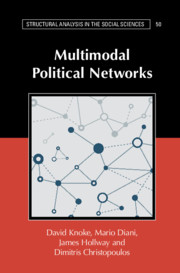Book contents
- Frontmatter
- Contents
- Figures
- Tables
- Preface
- 1 Politics, Communities, and Power
- 2 Multimodal Graphs and Matrices
- 3 Agency, Influence, Power
- 4 Political Communities in a Policy Network
- 5 Individuals in Associations
- 6 Agents and Events in Collective Action Fields
- 7 Nations Trading and Fighting
- 8 Legislative Influence
- 9 The Potential of Multimodal Political Networks
- Appendices
- References
- Index
1 - Politics, Communities, and Power
Published online by Cambridge University Press: 12 May 2021
- Frontmatter
- Contents
- Figures
- Tables
- Preface
- 1 Politics, Communities, and Power
- 2 Multimodal Graphs and Matrices
- 3 Agency, Influence, Power
- 4 Political Communities in a Policy Network
- 5 Individuals in Associations
- 6 Agents and Events in Collective Action Fields
- 7 Nations Trading and Fighting
- 8 Legislative Influence
- 9 The Potential of Multimodal Political Networks
- Appendices
- References
- Index
Summary
Chapter 1 lays out the cornerstones of our argument. We highlight how power is multidimensional and is related to network position. We review several works on field theory, contest arenas, and social spaces to highlight how analysts can theorize political action in multimodal settings. Then we explain why communities are a key concept for theory and research in political networks: how they can be identified, how they are created, and what effects they have on individual-, community-, and systemic-level outcomes. Last, we show that while some researchers have studied multimodal social networks (particularly 2-mode networks), few have conducted systematic treatments of multimodal political networks.
Keywords
- Type
- Chapter
- Information
- Multimodal Political Networks , pp. 1 - 19Publisher: Cambridge University PressPrint publication year: 2021

